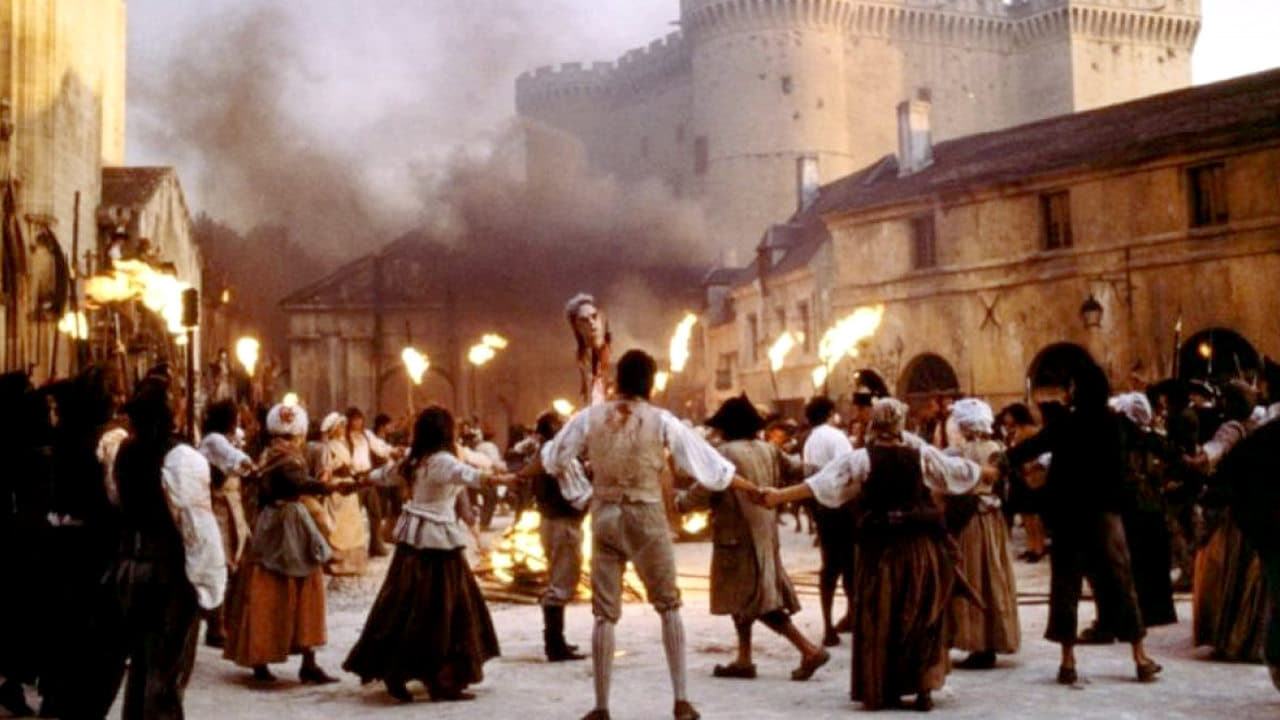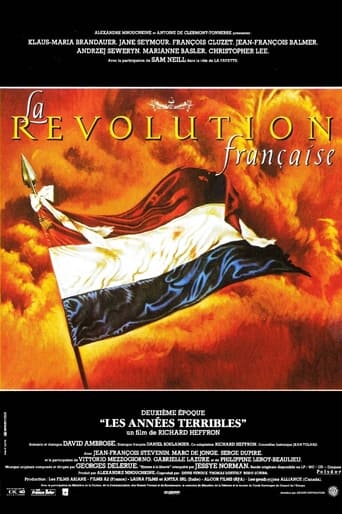

La Révolution française is an outstanding piece of cinema. Made with high budget and awesome cast of world-level stars, this is an incredible depiction of deeply tragic events of French Revolution of the 18th Century. Some critics pointed, however, that the film suffered from its neutrality, which resulted in a lack of point of view and in some incoherence. The first part, which dealt with a rather complex historical subject, was also criticized for its disjointed pacing. The second part was considered more gripping and dramatic. Jean-François Balmer received great praise for his portrayal of a rather sympathetic Louis XVI, and Andrzej Seweryn was considered very convincing as Robespierre. I can only add that this is a Must see and a real severe warning to all of all - revolution is evel, with a Capital E, and it leads only to deaths, suffering, blood, tears, pain, loss, desperation and tragedy.
... View MoreDivided into two parts, this long film relates the events of the French Revolution, a dramatic moment that we all know and one of the turning points in the history of mankind. Therefore, as most people know the historical facts, let's go to the film itself.Directed by Robert Enrico and Richard T. Heffron, has Klaus Maria Brandauer, Andrzej Seweryn, Jean-François Balmer and Jane Seymour in the lead roles, respectively incorporating the revolutionary Georges Danton and Maximilian Robespierre and the ill-fated french kings Louis XVI and Marie Antoinette. The cast also includes other notable European players, as it is an entirely European production.The most interesting thing about this film is the historical accuracy that all production tried to achieve, not only in the account of events, but also in terms of costumes and locations where it was shot. This allows the audience to fully understand the sequence of events and how each character lived them. Unlike other films, which often took place on the barricades of Paris and glorified (or not) the revolution, this film tries to be impartial and manages to show us a more idealistic and human side of those who initially planned and made the revolution and how they lost control of it, due to its disunity and inability to cope with the speed and the derailing of events, increasingly bloody. The film also tells us the attempts of the king to solve his country's problems, and how he was hamstrung to address them without endangering himself in one way or another. The Balmer's Louis XVI is a genuinely good man who initially (in part due to the circumstances) collaborates with the revolution, but the radicalization of events would dictate his downfall and death, not so much by his mistakes but mainly because he has become politically inconvenient for the radical party.The more negative note is the "soft version" of the cruelest moments of the revolution, a fact that makes this film unable to mirror its hardness. The so-called "Terror" is no more than a few massacres in prisons, summary executions (more suggested than visible) and mobs in the streets with torches and spears. We didn't see the pillaging of Versailles, the destruction of the earlier king's graves or the countryside revolts, which rise up against the excesses of a revolution that made successive attacks against the Christian faith (or any other religion), followed by the french people. Maybe this decision of turn these scenes softer has its origins in the age restrictions, to prevent the movie from being classified as adults only. Still, this movie is an interesting document that allows us to "revisit" the French Revolution and even transmit historical knowledge (not everyone likes history) in a fun and interesting way.
... View MoreThis movie gets a 10 from me for the following reasons: 1. We all know 'documentary' style movies can be either historically accurate or entertaining; rarely both. THE FALL OF THE ROMAN EMPIRE (and its half-baked mediocre colossal remake GLADIATOR ) may be entertaining but mix history with nonsense, fiction and clip lots of edges; DIEN BIEN PHU is a rather historically accurate portrait, yet no entrainment to find there. This movie, in spite of its about 6h running time, is both historically accurate and entertaining: good reconstructions, good acting and historical accuracy, no nonsense or other Hollywood hogwash. The most impressive actor is Balmer as Louis XVI: truly a great performance, at times gut-wrenching. Brandauer as Danton (a bit acted like 007 mr.Largo ) is very good and Seweryn is very good as the demented Robespierre. Without taking explicit sides, this movie shows the revolution in all its aspects; very little edge-clipping (a notable one is omitting that Danton was coming back from Belgium when his wife died; Belgium where he carried his usual backstage deals to increase his own wealth ). The September massacres, the murder of pious princesse de Lamballe (only because she used to be the queen's favorite and had returned to assist her queen ) etc show the irrational, violent, gratuitous side of the revolution; the expedite COMITE DE SALUT as handy political tool to get rid of political opponents. Robespierre growing from self-assertive partisan of freedom into a demented tyrant who loved to compile 'lists' of 'conspirators' in the name of 'virtue'. Exceptionally well-rendered the moment in which he feels he lost power, his hallucinating speeches no longer work...he has a fit like the demented lunatic he is and -like the 'conspirators' he had until then accused- wants to raise in arms against the parliament. Saint-Just is another man growing from maximalist into another demented lunatic. Great reconstructions. A movie really worth watching.
... View MoreI loved this film, both the English and French versions! The detail was astounding, and the film managed to tell this complicated story without dropping any threads. Jean-Francois Balmer is touching as the hapless Louis XVI, a well-meaning but out-of-touch ruler totally out of his depth in the political and social upheaval that was to destroy him. The three main revolutionaries, Desmoulins, Danton and Robespierre are shown as genuine human beings with emotional ties to each other, but who start going their separate paths, at a time when disagreement leads not to estrangement but to death. The film is divided into 2 halves, "The Years of Light", describing the political changes taking place in France as the revolution approaches, and "The Years of Terror", beginning with the arrest of the King and proceeding through the Terror through to the death of Robespierre. The second half is better, with more action and suspense, as familiar characters become swept up in the destruction and insanity of a Revolution going out of control. Andrej Seweryn is superb as the cool tyrant sending his enemies and their families to their bloody deaths, while gently describing his view of the world as one governed by a spirit of goodness and virtue. His sudden fall from power in the National Assembly is spellbinding, and the movie roars to a conclusion as the first of the revolutionaries becomes the last victim of the guillotine. The only jarring performance in this film is that of Peter Ustinov in the first half, who tends to play himself rather than the great moderate, Mirabeau. The rest of the international cast is wonderful.
... View More